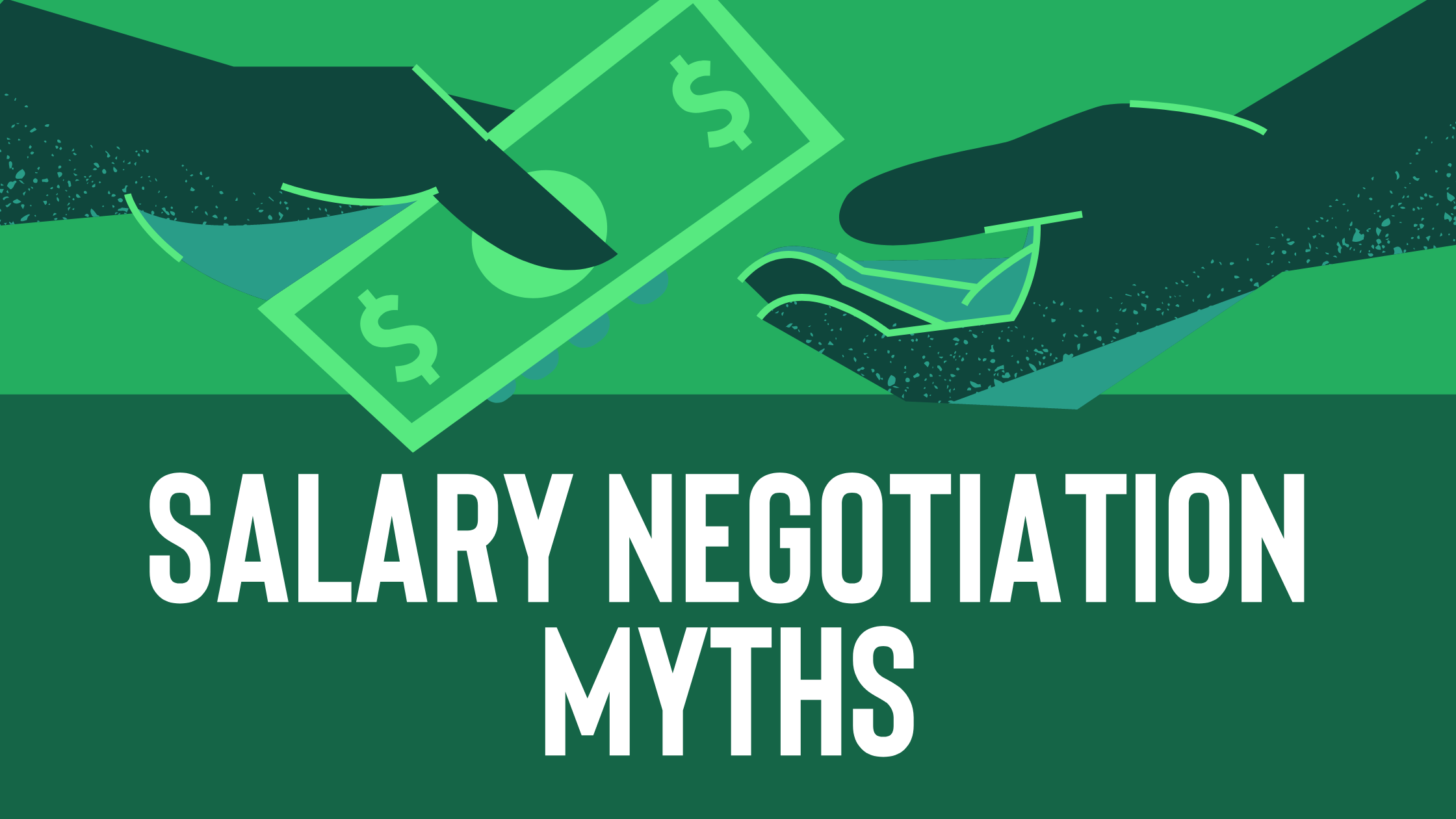

It’s no secret here that it’s important to negotiate your salary and advocate for yourself, no matter the circumstances. However, several salary negotiation myths could be holding you back from doing just that.
?
Harmful narratives like “negotiating salary might be seen as combative” or “I shouldn’t get greedy” come from these myths, preventing employees from negotiating and ultimately keeping them underpaid. I know it because I once had these same narratives running through my head.
I didn’t negotiate at all for my first 2 jobs after college. I honestly thought I had no right to because I was so new to the field. Although I didn’t have any logical reason to think that, that fear comes from society’s general influence from the taboo of money and how talking about money can be seen as “rude”.
Imagine if I negotiated my pay for those first 4 years of my career, what I could have done with that money, and how that would’ve affected my current salary. I feel jipped.
It’s time to debunk these myths once and for all.
?
Key points:
- Negotiation myths keep workers overworked and underpaid, holding them back from years of additional earnings and wealth building.
- Salary negotiation is a normal part of any hiring process.
- Negotiating pay is a professional occurrence and demonstrates your value to the company. Especially when you come armed with your market rate.
- Employers expect negotiations and are prepared for them. You should be too.
Myth #1: You’ll lose a job offer by negotiating salary.
Why the myth exists:
Thinking you might lose a job offer because you negotiated is a common occurrence. Especially when you don’t have much experience negotiating. This myth arises from not having much experience negotiating and the fear of being seen as overly demanding.
Debunking the myth:
It isn’t a part of normal business operations to pull a job offer when a candidate negotiates, and could indicate a poor company culture.
Negotiating salary is a common and expected part of the job offer process. Employers typically anticipate some level of negotiation when thinking about their budget for the position.
Myth #2: You shouldn’t talk about pay too early in the interview process.
Why the myth exists:
This myth often stems from concerns about appearing overly focused on compensation rather than the job itself. Additionally, there may be a fear of pricing oneself out of consideration or creating an awkward conversation.
Debunking the myth:
?
Discussing pay early in an interview process can actually benefit both parties. It ensures alignment on salary expectations and avoids wasting time if there's a mismatch. It also demonstrates pay transparency and helps establish trust between the candidate and employer.
Not knowing your market rate can put you at a disadvantage when interviewing for different jobs. You’ll need to do market research to make sure you’re getting paid fairly before moving forward in any hiring process. Use our free Market Research Guide and salary negotiation scripts to help you bring up pay sooner rather than later.
Myth #3: You shouldn’t ask for more money when the position already has a higher salary than your last job.
Why the myth exists:
Some individuals may believe that since the salary is already higher than their previous job, they shouldn’t push for more. The same thing applies when asking for a raise. They may fear that the employer would see them as entitled and greedy.
Debunking the myth:
Your worth is not solely determined by your previous salary. Asking for more is a common and reasonable practice, especially if the new role involves more responsibilities.
It doesn’t matter how much of a high-paying job it is. Employers understand that candidates seek fair compensation based on their skills and the market value of the position.
Myth #4: Only your salary is negotiable.
Why the myth exists:
Even though salary negotiations take center stage during job offers, money isn’t the only thing on the table. Many candidates may not realize that you can also negotiate benefits and perks.
Debunking the myth:
Employers often have flexibility in various components of the compensation package beyond just salary. Benefits like health insurance, vacation time, and professional development opportunities can all be subject to negotiation. Considering these factors holistically allows you to maximize your overall compensation and job satisfaction.
?
Myth #5: Negotiating is rude.
Why the myth exists:
There are cultural and societal norms that discourage discussions about money or perceived discomfort with assertiveness in negotiations. Some may fear that negotiating could be seen as ungrateful and hurt their chances of getting along with the employer. For instance, gender stereotypes may negatively affect negotiations. Even though research shows that women negotiate just as much as men do, they may have entirely different experiences.
Debunking the myth:
Negotiating is a part of a professional hiring process and is far from rude. It's a crucial step in ensuring a mutually beneficial employment agreement. Employers anticipate negotiation and often respect candidates who advocate for themselves professionally.
Myth #6: You should accept a low salary just because you’re younger.
Why the myth exists:
Younger individuals may feel pressure to accept lower salaries due to limited experience or the assumption that they should be grateful for any opportunity.
Debunking the myth:
Your age does not dictate your worth or what you deserve in terms of compensation. It's your skills, qualifications, and the contributions that matter. Accepting a low salary solely based on age perpetuates unfair compensation practices and undermines your value in the workforce.
?
Plus, pay discrimination is illegal. Companies can’t discriminate against you based on your age, or anything else. Additionally, there are organized groups such as unions that exist for some of the highest-paying trade jobs that can help fight pay discrimination and negotiate on your behalf.
Myth #7: You have to tell them your past salaries if they ask.
Why the myth exists:
There are historical hiring practices where employers commonly asked for past salary information as part of the hiring process. Some candidates may believe they are obligated to disclose this information to proceed with the application or negotiation process.
Debunking the myth:
You are not legally obligated to disclose your past salary to potential employers, and in many states, there are pay transparency laws that prohibit employers from asking for this information.
Revealing past salaries can perpetuate wage gaps and undermine your ability to negotiate based on your qualifications and the market value of the position. Instead, focus on discussing your salary expectations and the value you bring to the role.
Myth #8: You shouldn’t negotiate higher than the posted salary range.
Why the myth exists:
This myth may arise from concerns about overstepping boundaries or appearing unrealistic in negotiations. Some may believe that the posted salary range represents a firm limit set by the employer and that negotiating beyond it is not acceptable.
Debunking the myth:
The posted salary range is often a starting point for negotiation rather than a strict boundary. Employers typically have some flexibility in adjusting salary offers, and also provide salary ranges. Negotiating higher than the posted range is not uncommon, especially if you can demonstrate the value you bring.
?
Myth #9: Rejecting an offer will ruin future opportunities.
Why the myth exists:
It’s normal to be scared of burning bridges in your career. No one wants to be perceived as ungrateful or difficult to work with. Candidates may worry that turning down a job offer from a particular company could negatively impact their chances of securing future opportunities with that organization or within the same industry.
Debunking the myth:
Rejecting a job offer is a common occurrence and is unlikely to permanently damage your professional reputation or future prospects. While it's essential to handle the situation respectfully and professionally, employers understand that candidates may have valid reasons for declining an offer.
?
Approaching Negotiations With Clarity and Confidence
Anytime a negotiation myth pops into your head, a great way to help debunk it is to talk about it. You aren’t the only one who has these doubts. Start discussions with coworkers and friends about salary, how to ask for a raise, and your negotiation fears.
Being transparent about our salaries helps to face these myths head on. Pay transparency arms us with the knowledge and tools to not only increase our income, but also help us understand our overall value as job candidates.
Remember that negotiating is another way that you’re demonstrating your value. If you don’t value yourself in your career, who will?
Want to join the movement? Explore over 5,000+ individually reported salaries nationwide across all industries in our Salary Database!
That wraps it up for this week. Until next time, stay awesome, stay strong, and keep advocating for yourself no matter what! I’m Daniella, a writer, engineer, and creator of I Like to Dabble and Remote Work Bestie - my blog and podcast for leveling up your money, career, and side hustles. I’m extremely passionate about workers' rights and financial freedom, so it’s a pleasure to be able to bring you this type of content through the Salary Transparent Street blog (thank you for the opportunity, Hannah!) You can also follow me on Instagram, TikTok, Linkedin, and Twitter. Chat soon!
If this guide helps you improve your negotiation skills, let us know! Send us an email ➡️ hello@salarytransparentstreet.com
For more Salary Transparent Street resources:
- Do you know if you're being underpaid? Take our free quiz to find out!
- Need help determining your market rate? Download our free Market Research Guide to learn what you should be making.
- Need help negotiating your salary? Download our free Salary Negotiation Guide!
- Follow us on TikTok, Instagram, Facebook, YouTube and LinkedIn for daily pay transparency interviews and career news you can use!
- Subscribe to our weekly newsletter for news updates, professional deep dives, learning opportunities, and more!


